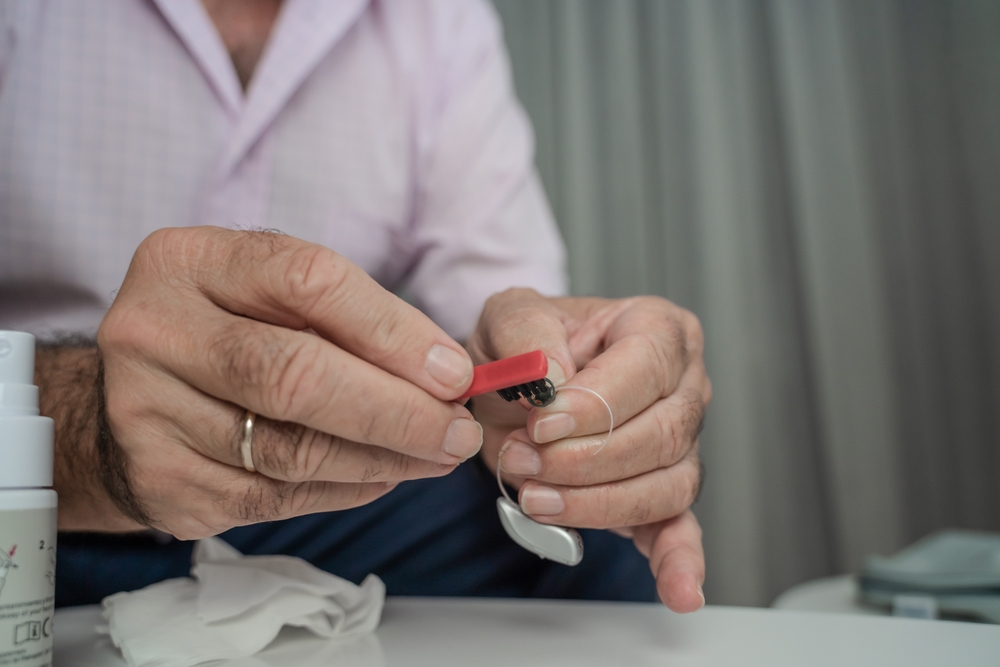Your Guide to Cleaning and Storing Your Hearing Aids Safely
We get it: when you start wearing hearing aids, you might feel confused about how they feel and what you need to do to take care of these small devices. The good news is that our experienced staff at Fairfax Hearing Center is here to help every step of the way, from the initial fitting, through the adjustment period, and ongoing support.
The most important thing to remember is that hearing aids are like little computers, which means that maintenance and care can impact their performance. Normal exposures such as sweat, moisture, and earwax can impact the durability of hearing aids. Additionally, it’s critical that you are careful about proper storage techniques when the hearing aids aren’t in use.
The truth is that hearing aid care doesn’t have to be complicated. All you need to do is learn a few core habits and stick to these routines going forward. In this guide, we are sharing the basic things that you need to know. You’ll also learn about these things when you are in our office for an appointment.
Our goal is to help you protect your hearing aids so that you can extend their lifespan and avoid repairs. Plus, good care and maintenance help you enjoy the best sound quality each day.
Protecting the Sensitive Components in Your Hearing Aids
There are several parts of the hearing aid that are especially sensitive to damage and wear: the receivers, microphones, battery contacts, tubing, domes, and wax guards.
Earwax is a common offender that can impact the performance of your hearing aids. It’s normal and healthy to have earwax, but the wax can collect on the hearing aid and block the sound pathways. As a result, you will experience feedback in your ears or notice that the audio is muffled.
Additionally, hearing aids can be affected by different types of moisture, such as humidity, sweat, and other types of moisture. If this happens, it can result in corrosion or damage within the hearing aid.
Our team will help you get to know your hearing aids and how they can be cleaned to prevent damage from moisture and earwax. The best cleaning practices vary, which is why we will offer personalized cleaning recommendations.
Simple Daily Cleaning Habits That Make a Big Difference
It only takes a minute or two out of your day to clean your hearing aids and prevent damage. We recommend adding this to your nightly ritual, in the same way you brush your teeth every night before bed. Follow these steps:
- Use a soft, dry cloth to wipe down the hearing aid.
- A small cleaning brush can be helpful to brush away any debris near the microphone openings.
- Inspect the earmolds and domes to find and clean any earwax buildup.
- Look closely at the tubing to see if there are any moisture droplets or discoloration.
Warning: You should never use household cleaners, water, or alcohol on your hearing aids. These liquids can damage both the electronics and coatings, causing serious problems with the performance of your hearing aids.
Also, it’s best to avoid blowing into the ports because the air can actually push the debris inside even more. This is why we recommend that you use a small cleaning brush to gently wipe away any debris.
A Weekly Deep Clean for Your Hearing Aids
Once a week, spend a little more time cleaning your hearing aids more thoroughly. These deep cleaning recommendations vary depending on the type of hearing aid that you have:
- RIC or TIE Devices: These hearing aids might need to have the wax guards replaced if they are clogged. Also, remove the domes and clean them with a gentle cloth (only if this step is recommended by the manufacturer). Finally, custom molds can be cleaned using a vent cleaner.
- BTE Devices: With this type of equipment, you can often detach the earmolds from the hearing aid. The mold can then be soaked in warm, soapy water. Be very careful, because the electronics of the hearing aid should NEVER get wet. Always make sure that the molds are completely dry before they are reattached.
If more advanced cleaning is necessary, then the best solution is to visit our audiology clinic. We have specialized cleaning tools and diagnostic equipment to safely clean everything without damaging the hearing aids. It’s perfectly normal to need professional cleanings at times because it’s common for the hearing aids to get waxy over time.
Moisture Management is Critical for Hearing Aid Longevity
Moisture is known as the “silent killer” of hearing aids. If a little bit of moisture gets into the electronics, then it could damage the performance. Too often, patients don’t realize that sweat or humidity is creeping into the device until it’s too late. So, we recommend that every patient take a proactive approach to prevent moisture, especially when you are exposed to environmental risks (hot climate conditions, workouts, rain, bathrooms, kitchens, etc.).
One option is to use a hearing aid dehumidifier, which is just a small electric drying box. Dehumidifiers can make a big difference because they can pull the moisture out of the delicate components within the hearing aid, which prevents corrosion over time. If you have a battery-powered hearing aid, it’s a good idea to open the battery doors at night to air out the inside.
Be very careful to avoid storing hearing aids anywhere they might be exposed to moisture, such as the car, a coat pocket, or a bathroom.
Always Follow Smart Storage Habits
It might be tempting to toss the hearing aids on the nightstand at the end of a long day or keep them stored in a purse or small bag. But these habits increase the risk of damaging your hearing aids.
The ideal storage solution is to always place your hearing aids in a dedicated case when you aren’t wearing them. Then, place that case in a safe spot, such as a drawer (so that it is away from kids and pets).
Follow these habits even when you are traveling. For example, if you take off your hearing aids to go through airport security, make sure to put them in a storage case first.
Keep the hearing aids in a cool, dry, stable environment when they are being stored. Extreme temperatures (such as leaving the hearing aids in a hot car) can cause damage.
Our Hearing Aid Experts are Here to Help
If you have questions or need personalized recommendations to care for your hearing aids, then reach out to our team for more information.
You are invited to contact us online or give us a call or text us at 703.343.9732 to ask questions and schedule an appointment.

